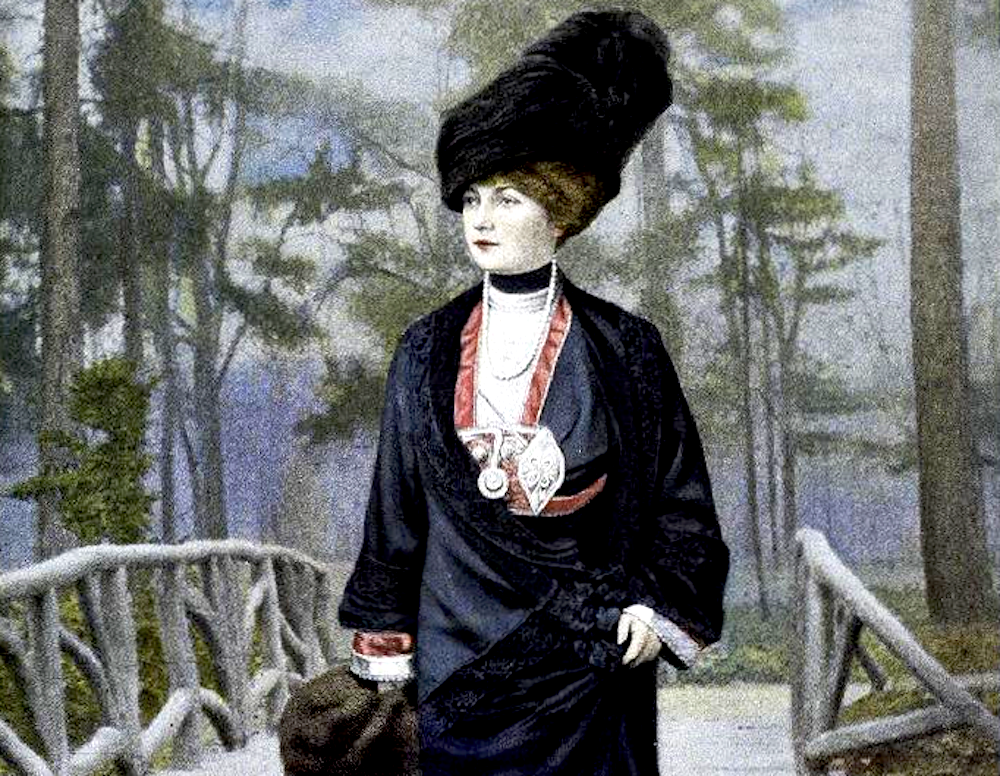- Happy International Women’s Day. A century ago, in Paris, as the Great War raged, women were putting on pairs of coveralls and taking to the factories, trying to balance gender norms with the demands of wartime; men, flummoxed to find women at work, behaved generally like oafs, as is their wont. An exhibition in Paris, “Mode et Femmes, 14/18,” explores the upheaval surrounding women’s fashions at the time, and its deeper causes. Rebecca Appel writes, “If the war accelerated modernization already underway, fashion also reflected profound anxiety about women’s liberation … As men were called up, women took traditionally male jobs (driving trams, delivering mail, working in factories), and their clothes reflected both the cultural ambivalence about this shift, and its temporary nature. Nurses excepted, most women wore their own dresses on the job, denoting official roles with homemade insignia … the government eventually mandated that factories provide protective workwear for women, but images of female industrial workers in men’s gear generated biting criticism in the press. One 1917 magazine caricature in the exhibition shows a bar scene, with a woman in coveralls talking to a male factory worker. ‘What’s your husband doing?’ he asks. ‘He’s at home mending my silks,’ the woman responds.”
- Not nearly enough has changed in the intervening century. Eliza Starbuck Little, writing on Chris Kraus’s concept of the “Serious Young Woman,” says, “One of the first times I TAed a philosophy class, the professor I was working with remarked on what a great choice I was for the position … I was a woman of color, and it was good for students to see someone who looked like me at the front of the classroom in a field that struggled with diversity. I was crushed; my work in philosophy stood at the center of my self-understanding in a way that my appearance never had. But he wasn’t wrong. Teaching is the academic counterpart of artistic performance. Standing in front of a classroom full of students, you are forced to appear before a group of human beings who are old enough to have a complete set of acculturated stereotypes but who have, for the most part, only just begun reflecting on them. A colleague of mine noted offhandedly that as women, we have only two pedagogical archetypes to work with—mother and lover, each authoritative in her way but neither one admired for her philosophical genius. When my anger subsided, I realized for the first time that I had no vision of what success looked like in my field for me as me.”
- With The Great Gatsby as his metaphor, Rick Perlstein dismantles the valorization of “smarts” among the elite liberal set: “In that dialogue in which Tom Buchanan dresses up his racism in scientific raiment, all of us, because we know ourselves to be sophisticated and smart, identify with Daisy Buchanan. Fitzgerald had also figured out something shrewd about such—but how shall we put it—cultural sophisticates? Effete snobs who characterize themselves as intellectuals? Elite liberals? … Smart is an identity. Smart has a politics. Smart can be a road to authenticity, or Smart can be a con … Smart carries within it its own logic of domination, resistance, resentment—the logic that produces both reactionary pedants and ferociously winking liberal elites … more and more with each passing year, in American culture and politics, smart has become a dangerous stand-in for judgments concerning self-evident moral worth.”
- George Saunders has something urgent to tell you about Grace Paley, “one of the great writers of voice of the last century. There’s an experience one has reading a stylist like her that has to do with how rich in truth the phrase-or-sentence-level bursts are and how quickly they follow upon one another. An image or phrase finds you, pleases you with its wit or vividness, shoehorns open your evolving vision of the fictive world, and before that change gets fully processed, here comes another. You find yourself having trouble believing this much wit is washing over you. A world is appearing before you that is richer and stranger than you could possibly have imagined, and that world gains rooms and vistas and complications with every phrase. What you are experiencing is intimate contact with an extraordinary intelligence, which causes the pleasant sensation of one’s personality receding and being replaced by the writer’s consciousness.”
- Do you have access to classified information? Hey, neato, buddy! We’re all super impressed with you. But as Jeremy Bernstein knows from experience, you’re probably not sitting on anything too hot: “In summer 1958, I was briefly a consultant for the Rand Corporation in Santa Monica. I had a Q clearance, the most rigorous that the Atomic Energy Commission had. This enabled me to receive classified information on nuclear weapons on a ‘need to know’ basis. During most of my short stay I didn’t need to know anything, but one day the theory division leader descended on me with stacks of numbers he wanted me to add up on a Marchant calculator … I left Rand before the report was written so I never saw it. In 1960 I was working at the Brookhaven National Laboratory on Long Island. My Q clearance was no longer active. But I received a phone call from the lab security people saying a package had arrived from the Rand Corporation and they wanted my permission to open it. I said that I could not give my permission without seeing the contents and they said that I couldn’t see them because they were classified. I told them to send the package back to Rand. By now all the details of this business are available in the open literature and the whole classification seems absurd.”
from The Paris Review http://ift.tt/2mY9JLl

Comments
Post a Comment